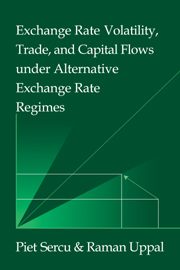Book contents
- Frontmatter
- Contents
- Acknowledgments
- Guide to Notation
- 1 Introduction and Overview
- 2 Modeling Exchange Rates: A Survey of the Literature
- 3 A Simple General-Equilibrium Model of an International Economy
- 4 The Spot Exchange Rate in a Large Class of General-Equilibrium Models
- 5 Forward Exchange Rates in a Model with Segmented Goods Markets
- 6 International Trade Flows, Exchange Rate Volatility, and Welfare
- 7 International Capital Flows and Welfare
- 8 Tariff Policy with International Financial Markets
- 9 Endogenous Monetary Policy and the Choice of Exchange Rate Regime
- 10 Concluding Thoughts
- References
- Author Index
- Subject Index
10 - Concluding Thoughts
Published online by Cambridge University Press: 23 October 2009
- Frontmatter
- Contents
- Acknowledgments
- Guide to Notation
- 1 Introduction and Overview
- 2 Modeling Exchange Rates: A Survey of the Literature
- 3 A Simple General-Equilibrium Model of an International Economy
- 4 The Spot Exchange Rate in a Large Class of General-Equilibrium Models
- 5 Forward Exchange Rates in a Model with Segmented Goods Markets
- 6 International Trade Flows, Exchange Rate Volatility, and Welfare
- 7 International Capital Flows and Welfare
- 8 Tariff Policy with International Financial Markets
- 9 Endogenous Monetary Policy and the Choice of Exchange Rate Regime
- 10 Concluding Thoughts
- References
- Author Index
- Subject Index
Summary
We have developed a general-equilibrium, intertemporal framework of a stochastic world economy. In this framework, decision rules of individual agents with rational expectations are derived based on optimizing behavior, and the prices of goods and financial securities, the interest rate, and the exchange rate are determined endogenously. We have explicitly modeled the segmentation of commodity markets by introducing a cost for shipping goods across countries; thus, our model allows for deviations from the law of one price. We have also considered the effect of the opening international financial markets on welfare.
We have used this framework to understand the behavior of the spot and forward exchange rates and international trade in goods and financial claims. We have also evaluated tariff policy, monetary policy, and the choice of the exchange rate regime in this setting.
We characterize the spot exchange rate in a fairly general setting: without restricting the number of goods and countries, the utility functions, production processes, or the nature of frictions in international goods markets, but assuming that financial markets are complete and integrated, we show that the nominal exchange rate reflects cross-country differences in initial wealths, and marginal indirect utilities of nominal spending. More important, the expression that we get for the exchange rate is a nonlinear one, with changing coefficients.
De Grauwe, Dewachter, and Embrechts (1993) report that the behavior of exchange rate returns is complex and nonlinear.
- Type
- Chapter
- Information
- Exchange Rate Volatility, Trade, and Capital Flows under Alternative Exchange Rate Regimes , pp. 125 - 128Publisher: Cambridge University PressPrint publication year: 2000



